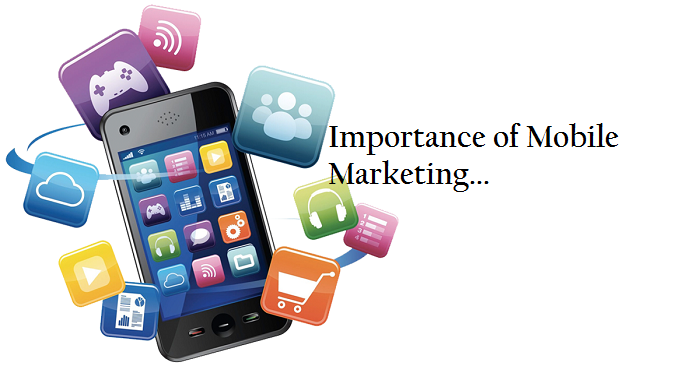
Mobile marketing service businesses in the digital age, empowering them to thrive amidst rapid technological advancements. With ubiquitous smartphones, leveraging mobile platforms becomes imperative for effective customer engagement.
Mobile marketing enables unparalleled accessibility, allowing businesses to connect with consumers anytime and anywhere. Companies can forge deeper relationships and foster brand loyalty through personalized interactions and targeted campaigns.
Moreover, mobile marketing facilitates seamless transactions and enhances user experiences, driving conversions and revenue growth. In today’s competitive landscape, embracing mobile marketing strategies is essential for staying ahead, maximizing reach, and capitalizing on the ever-evolving preferences of tech-savvy consumers.
Understanding the Importance of Mobile Marketing
Understanding the importance of Mobile marketing service is paramount in today’s digital landscape. As smartphones integrate into daily life, businesses must leverage mobile’s potential for consumer connection. Mobile marketing facilitates unparalleled accessibility, enabling companies to reach audiences at any time.
Moreover, it fosters deeper engagement and allows personalized interactions, enhancing brand loyalty and driving conversions. Embracing mobile marketing ensures relevance, extends reach, and engages evolving consumers.

Accessibility is a cornerstone of mobile marketing, providing businesses with unparalleled reach and digital connectivity. With smartphones becoming indispensable tools in daily life, accessing information, products, and services has always been challenging.
Mobile devices provide users with the flexibility to access content, broadening businesses’ audiences. Companies can ensure seamless user experiences across various devices and platforms through mobile-optimized websites, apps, and responsive design. Incorporating accessibility in mobile marketing boosts satisfaction and fosters growth in our mobile-centric environment.
Reach and engagement are pivotal aspects of Mobile marketing service, enabling businesses to connect with their audience more deeply. Companies can extend their reach to a vast audience through mobile platforms, transcending geographical boundaries and time constraints.
Moreover, mobile marketing facilitates real-time interaction and engagement, fostering meaningful customer relationships. By leveraging mobile apps, social media, and messaging services, businesses can deliver targeted content and personalized experiences, driving higher engagement and brand loyalty.
The ability to reach audiences wherever they are and engage with them in meaningful ways is a crucial advantage of mobile marketing strategies.
Personalization
Personalization is a cornerstone of effective mobile marketing, allowing businesses to tailor their messages and experiences to individual preferences. By leveraging data analytics and user insights, companies can deliver targeted content and promotions that resonate with their audience personally.
Personalized recommendations, customized offers, and tailored communications enhance relevance and engagement, fostering stronger customer connections. In today’s competitive landscape, the ability to deliver customized experiences sets businesses apart, driving loyalty and increasing conversions. Personalization in mobile marketing improves customer satisfaction and boosts brand perception and long-term relationships.

Components of a Successful Mobile Marketing Strategy
To harness the full potential of mobile marketing, businesses must adopt a comprehensive strategy that encompasses various elements:
Mobile-Friendly Website
A mobile-friendly website is indispensable in today’s digital landscape, ensuring an optimal user experience across various devices. With the increasing prevalence of smartphones and tablets, users expect seamless browsing experiences regardless of their device.
A responsive website adjusts automatically, simplifying user navigation effortlessly. Businesses prioritizing mobile optimization enhance accessibility, improve search engine rankings, and reduce bounce rates. A well-designed, mobile-friendly website enhances user satisfaction and drives engagement and conversions, ultimately boosting business success.
Mobile Apps
Apps are pivotal in modern business strategies, offering a direct channel for engaging customers and enhancing brand loyalty. Mobile apps foster deeper connections with users by providing convenient access to products, services, and exclusive offers.
Moreover, they enable businesses to leverage device features such as push notifications and location services to deliver personalized experiences and timely updates. Mobile apps also facilitate seamless transactions, streamline customer interactions, and offer valuable insights through analytics.
As consumers increasingly rely on mobile devices for everyday tasks, investing in a branded mobile app is essential for staying competitive and meeting evolving customer expectations.
SMS Marketing
SMS marketing remains a powerful tool for businesses to engage with their audience directly on their mobile devices. With high open rates and immediate delivery, SMS campaigns enable companies to deliver their subscribers time-sensitive promotions, alerts, and updates.
By crafting concise and compelling messages, businesses can capture attention and drive action, whether purchasing, visiting a store, or participating in a promotional event. SMS marketing also offers the advantage of reaching customers wherever they are, making it an effective channel for driving engagement and increasing conversions in today’s mobile-centric world.

Mobile Advertising
Mobile advertising has emerged as a cornerstone of digital marketing strategies, enabling businesses to reach their target audience effectively on mobile devices. With the prevalence of smartphones and tablets, mobile advertising offers unparalleled opportunities to connect with consumers throughout their daily routines.
Whether through social media ads, display banners, or in-app promotions, mobile advertising allows companies to deliver targeted messages and drive engagement with their brand. By leveraging precise targeting options and immersive ad formats, businesses can capture attention, increase brand awareness, and drive conversions, making mobile advertising a vital component of modern marketing campaigns.
Tips for Effective Mobile Marketing
To maximize the impact of mobile marketing campaigns, consider the following strategies:
Optimize for Mobile Search
Ensure your website and content are optimized for mobile search engines to improve visibility and rank higher in mobile search results.
Create Compelling Content
Craft engaging and visually appealing content that resonates with your target audience’s interests and preferences, capturing their attention and driving action.
Utilize Location-Based Targeting
Take advantage of geolocation technology to deliver personalized offers and messages based on users’ real-time locations, enhancing relevance and driving foot traffic to physical stores.
Implement Push Notifications
Deploy push notifications strategically to inform users about new products, promotions, and updates, encouraging repeat visits and conversions.
Trends in Mobile Marketing
The landscape of mobile marketing continues to evolve, with emerging trends shaping the future of digital advertising:
Augmented Reality (AR) Integration
Integrating AR technology into mobile apps and marketing campaigns offers immersive and interactive experiences, enabling brands to engage users innovatively.
Voice Search Optimization
The rise of voice-activated assistants and smart speakers has transformed how users search for information and make purchases online. Optimizing content for voice search enhances visibility and accessibility in this rapidly growing market segment.
Artificial Intelligence (AI) in Mobile Marketing
Artificial intelligence (AI) revolutionizes mobile marketing services by offering sophisticated tools to analyze data, automate processes, and personalize user experiences. AI algorithms enable businesses to gain valuable insights into consumer behavior, preferences, and trends, allowing for more targeted and effective marketing campaigns.
From predictive analytics to chatbots and recommendation engines, AI-powered solutions optimize user engagement and drive conversions. By harnessing the power of AI in mobile marketing, companies can streamline operations, enhance customer satisfaction, and stay ahead in the competitive digital landscape, cementing AI’s role as a game-changer in shaping the future of mobile marketing strategies.

Case Studies
Examining case studies offers valuable insights into the effectiveness of mobile marketing service strategies. For instance, a prominent fast-food chain leveraged mobile apps to enhance customer loyalty through personalized offers and seamless ordering experiences, increasing sales and customer satisfaction.
Similarly, a fashion retailer utilized location-based targeting to drive foot traffic to its stores, capitalizing on real-time data to deliver relevant promotions to nearby customers. These success stories underscore the power of mobile marketing to drive engagement and foster brand loyalty.
By studying such case studies, businesses can glean actionable lessons and tailor their mobile marketing efforts to resonate with their target audience, ultimately driving growth and competitiveness in the digital landscape.
Challenges and Solutions in Mobile Marketing
In the realm of Mobile marketing service, businesses encounter various challenges along with innovative solutions. Data privacy concerns pose a significant obstacle, requiring transparent policies and stringent security measures to build and maintain consumer trust.
Cross-platform compatibility issues also arise, demanding thorough testing and optimization to ensure seamless user experiences across diverse devices and operating systems. Additionally, the prevalence of ad blockers presents a challenge to traditional advertising methods, prompting brands to explore alternative, value-driven approaches that resonate with audiences.
By addressing these challenges head-on and embracing emerging technologies, businesses can navigate the complexities of mobile marketing effectively. Strategic adaptations, coupled with a commitment to user-centric practices, enable companies to overcome obstacles and capitalize on the vast potential of mobile platforms for sustainable growth and engagement.
Data Privacy Concerns
With growing concerns about data privacy and security, businesses must prioritize transparency and compliance to build customer trust and safeguard sensitive information.

Cross-Platform Compatibility
Ensuring seamless experiences across different mobile platforms and devices requires careful planning and testing to address compatibility issues and optimize user interactions.
Ad Blockers
The prevalence of ad blockers poses a challenge for mobile advertisers, necessitating creative approaches and value-driven content to engage audiences effectively.
The Future of Mobile Marketing
The future of mobile marketing holds immense promise and innovation. Mobile marketing services will evolve as technology advances, offering businesses new opportunities to engage with their audience. Emerging trends like augmented reality (AR), voice search optimization, and artificial intelligence (AI) integration will shape the landscape, creating dynamic and interactive user experiences.
Brands that embrace these innovations and adapt their strategies accordingly will gain a competitive edge in the digital marketplace. Moreover, the rise of 5G technology promises faster connectivity and enhanced capabilities, opening doors to even more immersive mobile experiences. Businesses innovate with technology, staying ahead of mobile marketing’s evolution.

Conclusion
In conclusion, mobile marketing services are a pivotal force driving businesses forward in the digital era. Its significance lies in its ability to foster accessibility, engagement, and personalization, revolutionizing how companies connect with their target audience. As technology evolves, embracing mobile platforms and staying attuned to emerging trends will be imperative for sustained success.
Despite facing challenges such as data privacy concerns and the proliferation of ad blockers, businesses can overcome these hurdles by prioritizing transparency, innovation, and user-centric strategies. By harnessing the power of mobile marketing, organizations can forge deeper relationships with customers, enhance brand visibility, and unlock new avenues for growth in an increasingly mobile-centric world.
How can mobile marketing benefit my business?
Mobile marketing can help businesses reach their target audience more effectively, increase brand visibility, drive sales, and enhance customer engagement by leveraging the widespread use of mobile devices.
What types of mobile marketing strategies are commonly offered?
Common mobile marketing strategies include SMS marketing, mobile app marketing, mobile advertising, location-based marketing, and mobile-responsive website optimization.







